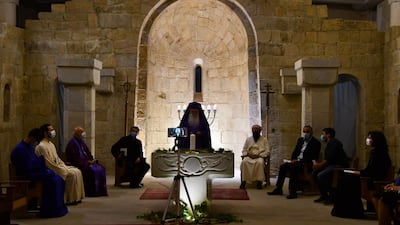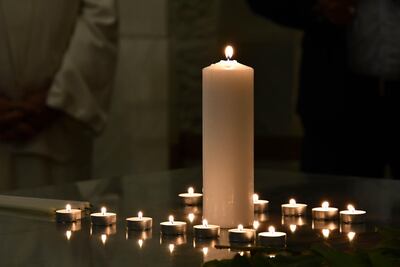On October 24, faith leaders from the Armenian, Azeri, Georgian and Yazidi community came together for the first peace prayer in the Peace Cathedral in Tbilisi, Georgia. They pledge to pray every Saturday until the war ends between Armenia and Azerbaijan.
The vigil attracted about 15 attendees but many more couldn’t join due to the risk of Covid-19 transmission. Others around the world from Iran to the US – rabbis, priests, imams and all in between – joined from their places of worship and homes.
It came as the US Secretary of State, Mike Pompeo, met Armenian and Azerbaijani Foreign Ministers to discuss how to resolve the conflict.
But the ceasefire that followed frayed yet again on Monday for the third time with both sides blaming the other for violating the agreement.
The fighting between Armenia and Azerbaijan over the disputed territory of Nagorno-Karabakh has now raged for more than a month, and cost over a thousand lives with many more injured and displaced.
"We're very concerned about what's happening in our region. We don't want war or any more loss of life. For us, every human has intrinsic value, regardless of their ethnic or religious background", said Dimitri Pirbari, a Yazidi spiritual leader, who led the first peace prayer on Saturday.
His family, like many other Yazidis at the time, emigrated to Georgia, which shares a border with Armenia and Azerbaijan, in the early 1900s during the Ottoman Empire.
Yazidi participation in the prayer was crucial as they recently experienced a genocide in the Iraqi region of Sinjar in 2014, said Malkhaz Songulashvili, Head Bishop of the Peace Cathedral.
The families of the dead are only now, six years later, beginning to exhume Yazidi mass graves in Sinjar as part of a UN mission to recover those killed by ISIS. "They came with this experience of enormous pain and they shared this experience," Mr Songulashvili said.
Tension evaporates in prayer
Armenian and Azeri communities make up 12 per cent of Georgia’s population, Crisis Group estimates. They have coexisted peacefully for many decades, live side-by-side in pockets of villages across the country and even learn each other’s languages.
When the conflict initially broke out there were tensions between both sides at the Peace Cathedral, Mr Songulashvili explains.
“It took some efforts to convince [the Azeri and Armenian clergy] that we should come together and pray without delay", he adds.
But when the service started, “the tension evaporated as we prayed for peace”, Mr Songulashvili said.
By the end of the service, neither the Azeri nor the Armenians wanted to leave the church.
"I'm very proud of the Azeri and Armenian clergy being in the same room because they are being harshly criticized by their own people for praying with their alleged enemies”, he adds.
The peace prayer emphasises that this is not a religious war. After recitations from the Quran, Bible and other holy scriptures in Georgian, Arabic, and Armenian, a candle of hope was lit.
Shared grief
“Georgia is a multicultural country and we live here together. We can't be at war, when there's war in our home country”, said Rima Marangozyan, an Armenian student living in Tbilisi.
Ms Marangozyan, who lost a close relative in the renewed conflict said it has put many of her friendships to the test and brought about a “cyber war” pitting people against each other.
But Ms Marangozyan, who has many Azeri friends, emphasises the importance of maintaining peace.
She recalls exchanging photos and stories of what happened in Ganja and Stepanakert with an Azeri friend. Sharing how their relatives were affected by the conflict, “we tried to look at both sides of the war because we know it's not the people who are guilty of the war”, she said.
“Ethnic hostility between Armenians and Azeris is artificial”, said Said Babazade, an Azeri journalist who lost two close friends in the conflict.
From folk songs like Sari Gelin to food like Dolma, meatballs wrapped in grape leaves, Armenia and Azerbaijan share many cultural characteristics, he said.
In fact, "we have more in common with Armenians than Georgians," Mr Babazade adds.
Georgia as 'secondary mediator'
Beyond peaceful coexistence, the new flare-up in the fighting is also a geopolitical nightmare for Georgia.
The country borders all main stakeholders in the conflict – Russia, Armenia, Azerbaijan and Turkey. Historically, Georgia has tried to maintain neutral ties with Armenia and Azerbaijan and keep out of disputes.
The last round of fighting over the Nagorno-Karabakh territory, which spans over 30 years, erupted in July.
But the renewed hostilities pose a greater threat to Georgia than in the past, said Alexander Scrivener, a research fellow at Eurasia Democratic Security Network.
Last week, a Russian MP of Putin’s United Russia party told the media that Moscow may send troops to Armenia over Georgian airspace if necessary and Georgia must ‘calmly accept’ the fact.
This week, reports circulated that Iran allegedly deployed military units to the Azeri-Armenian border.
At worst, Georgia could be “under pressure from all sides to allow transit of weaponry through its territory”, said Mr Scrivener.
While Georgia has little influence over the war, it could act “as a secondary mediator”, he explains. “Not top-level negotiations – but more secondary technical discussions between the two sides facilitated by Georgia”.
Georgian territory could also be used as neutral ground to build more intensive inter-community contact which would build on previous efforts, the researcher added.
The key is that Georgia doesn’t seek to “replace the more powerful players on the map”, he emphasises.
A meeting by the OSCE Minsk Group – established in 1992 to encourage peaceful negotiation on the Nagorno-Karabakh dispute – scheduled for October 29 to help reach a peaceful settlement has now been postponed. It comes as a missile struck the Azeri town of Barda killing 21 civilians.
Ahead of the second peace prayer, Mr Songulashvili said: “We hope there are not too many Saturdays. But if the war continues, we will continue to pray for peace.”















